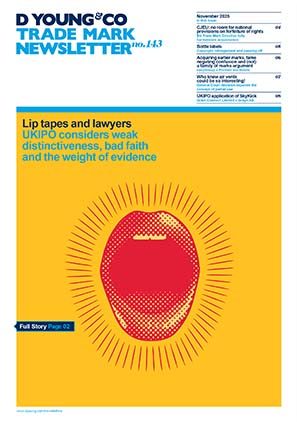Non-use revocation proceedings: German Federal Supreme Court questions relevance of no-challenge agreements
In T-419/16 (Carrera Brands Ltd v the EUIPO, 16 November 2017) the General Court quashed the relevance of contractual non-challenge agreements in EU revocation proceedings on grounds of non-use. In a remarkable side blow, the general Court even stated that national courts have no authority to sentence a party under national law to withdraw EU revocation applications. In the General Court’s opinion, the EUIPO and the EU courts are not bound by the way in which national courts interpret the contents of a no-challenge agreement.
On appeal (C-35/18, 14 June 2018) there was no comment from the Court of Justice of the European Union (CJEU) and so it was only a matter of time until national courts would return to this subject.
In the Leinfelder case (ZR 27/19, 19 November 2020), the German Federal Supreme Court (Bundesgerichtshof – BGH) has now referred two questions on the relevance of no-challenge agreements to the CJEU.
The questions
In a nutshell, the German Federal Supreme Court seeks CJEU clarification on:
- whether the fact that EU revocation proceedings on grounds of non-use do not depend on any specific legitimate interest and can be brought by any natural or legal person, would invalidate a contractual agreement by which a party undertakes in relation to the owner of an EU trade mark, not to challenge that EU trade mark on grounds of non-use, and
- whether a final judgment of a member state court, ruling that a defendant should withdraw an application for revocation of an EU trade mark on the ground of non-use, would have to be disregarded in revocation proceedings before the EUIPO and EU courts.
The underlying case
The parties in the proceedings previously formed a limited partnership (jewellery trading and production), and later agreed on various trade mark assignments, including, among other things, an undertaking for the seller not to challenge the Leinfelder trade marks or to assist third parties in doing so. In 2016, one of the defendants terminated the partnership agreement and had its attorney file EU revocation applications against the Leinfelder EU trade marks.
The plaintiff then requested that the court instruct the attorney to withdraw the revocation applications with the EUIPO. Both the Munich District Court and the Munich Appeal Court dismissed the action.
The decision
The Federal German Supreme Court held that the decision would depend on whether there was a legitimate interest for the plaintiff’s request in the national proceedings. This would not be the case if a final (national) judgment granting the request would not give the plaintiff any advantage (worthy of legal protection) in the EU revocation proceedings, which would depend on the interpretation of Art. 56 I a) CTMR/Art. 63 I a) EUTMR.
Incompatibility with EU trade mark law?
The Federal German Supreme Court generally holds that no-challenge agreements should be allowed and effective as long as they do not violate antitrust law in individual cases. As the enforcement of revocation claims is dispositive, a contractual agreement on the assertion of non-use of a trade mark should, in principle, be possible. If a contracting party agrees not to make use of this right, such an agreement would not violate Sections 134, 138 of the German Civil Code (abuse of rights). It would therefore depend on the individual case whether the agreement containing a no-challenge clause intends or results in an appreciable restriction of competition on the market (see also the Federal German Supreme Court judgment of 15 December 2015, KZR 92/13 – Pelican/Pelikan).
Anyone’s right of filing an application for revocation (even without legitimate interest) leading to invalidity of the no-challenge clause?
In contrast to the Carrera case, in the Leinfelder case the no-challenge objection did not feature in the revocation proceedings, as it was the fulfilment of contractual claims (aiming at withdrawal of the revocation applications) that were asserted. The general “principle of party’s disposition” would allow the withdrawal of a revocation claim at any time, which could also be determined by a national judgment granting the claim for withdrawal. Therefore, a national judgment would not interfere with the autonomous system of EU trade mark law.
Key takeaways and perspectives
It will be interesting to see whether the CJEU will follow the subtle arguments of the German Federal Supreme Court or whether it will agree with the General Court.
The legal tool “contractual no-challenge agreement”, which appeared dulled after the General Court’s Carrera judgment, could be re-sharpened by a CJEU judgment confirming the German Federal Supreme Court’s perspective. This would allow – by means of national law and before national courts – an EUTM owner to force an adversary – on the basis of a contractual no-challenge agreement – to withdraw a non-use based application for revocation before the EUIPO despite the General Court’s opinion on the issue.
